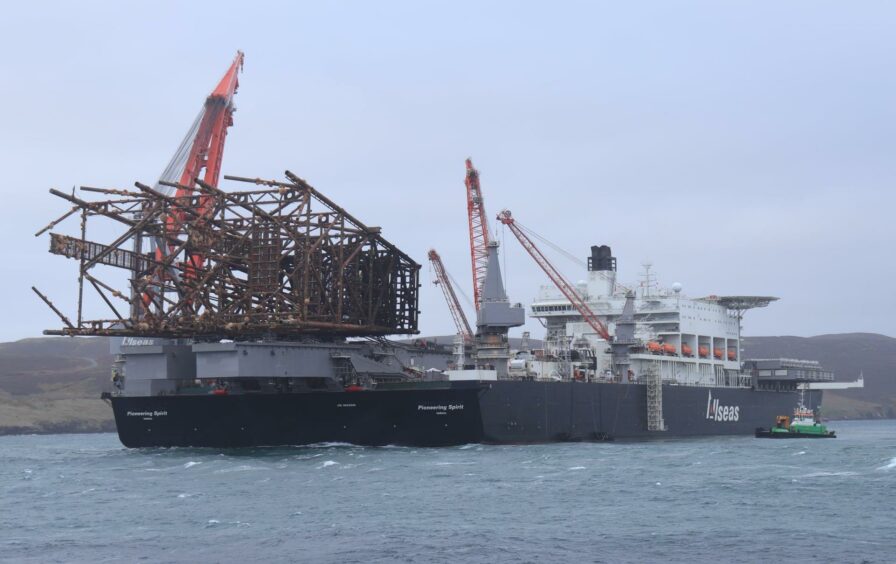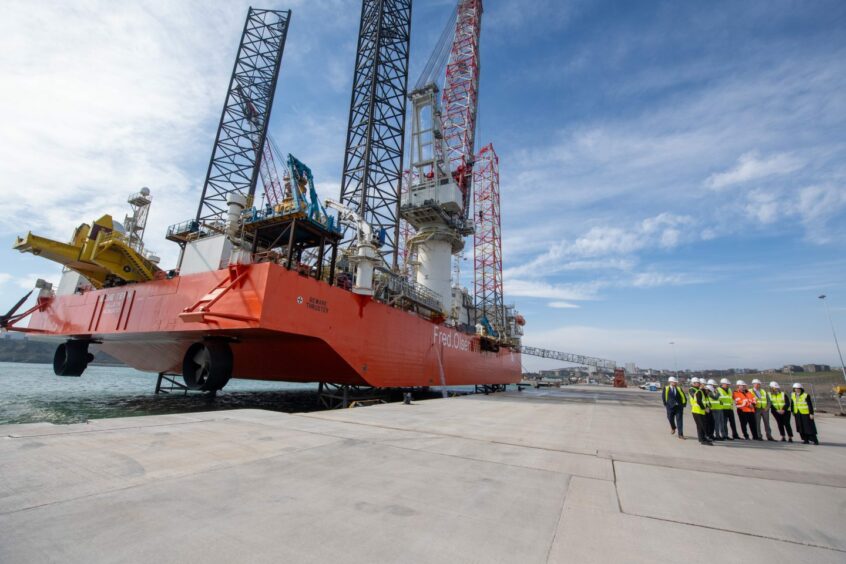
As unbelievable as it may sound to some, not every facet of the UK’s oil and gas industry is overflowing with cash.
Yes, the North Sea as a whole is in a much healthier state than it was when this supplement went to print three years ago, there can be no question there.
It is also true that many of the basin’s biggest players have posted eye-watering global profits in recent months – though ‘global’ is the key word here.
In reality the oil and gas boom days of the past are just that, and you simply need to take a stroll through Aberdeen – with its city centre on life support – to see that not all is well.
Pressure on the supply chain
For many of the North Sea supply chain companies that pepper the north-east, the post-Covid struggle rumbles on.
In taking the temperature of the nation’s energy supply chain earlier this year, Offshore Energies UK (OEUK) set alarm bells ringing – firms are in “crisis”.
Post-Brexit paperwork, a modest pipeline of North Sea projects, lack of talent, high taxes; all combining to test the mettle of energy companies up and down the UK.
Add in to that the pressure to transition and capture new opportunities, and the last thing the supply chain needs is financiers pulling the plug on oil and gas – you can see where this is going.
“We’ve seen this flight of capital from debt and equity; looking at the second part of that, it’s because a lot of private-equity funds struggle with their limited partners (LPs) on the back of saying it’s oil and gas, fossil fuel revenue. That is because the LP funds needs to show they are providing for the transition; the COP conferences in Paris in 2015, and Glasgow in 2021 set that in motion,” says Mark Munro, chief investment officer at the Scottish National Investment Bank (SNIB).
“When it comes to the debt side, banks have a similar challenge to the private-equity funds in terms of shareholder expectations and their demand to support green and renewable opportunities, as opposed to fossil fuel opportunities. Those external factors on the providers of capital obviously feed through to companies.”
Seeing the retrench of private capital first hand
Munro has some 20 years’ experience as a corporate investment banker – about three quarters of that has been energy specific, particularly in the upstream segment.
During his career he has had a hand in “Neo Energy’s four or five acquisitions, Premier Oil going into Harbour Energy, and the creation of Neptune Energy”.
Moving away from the operator space in August 2021 Munro joined the SNIB, a state-owned investment body that helps fund projects across Scotland, including in the energy supply chain.
Since then he has seen “the impact of traditional lenders retrenching” from oil and gas, with investors tarring firms with the same brush, even though, for many, renewables is now a bigger part of their business.
Munro said: “There’s a European directive that influences the way in which you can badge something as a green fund or a transition fund.
“That has a part to play because fossil fuels are just seen as dirty, and if a company has almost any composition within its revenue, it’s automatically put in that oil and gas bucket.”
It is not a problem that is unique to the UK either, and Munro notes that companies in the US and Norway “are having similar difficulties” in securing capital.
“The last institution I worked at before here was DNB of Norway – one of the largest providers of finance to oil and gas and oilfield services companies – and it my view they are already on this path and further ahead,” he said.
Decom tarred with same brush
Even those firms working to remove, scrap and recycle the North Sea’s oil and gas infrastructure are finding it hard to woo investors.
As “unfortunate as it is”, decommissioning companies – which sit in something of limbo – are still cast into the “oil and gas is bad” hopper, says Munro.
Clearly for those companies, be they oilfield services, decom or otherwise, trying to diversify their activities, the lack of available cash is making a tough task all the harder.
Equally concerning is the risk it poses to the objective of a just transition for workers from oil and gas to renewables, given the swathes of jobs wrapped up in the energy supply chain.
SNIB transition finance principles
Fortunately – in no small part due to his upstream background – the negative ramifications of capital drying up is something Munro, and the SNIB, are acutely aware of.
At the end of the June the bank unveiled several guidi ng transition finance principles, each designed to aid the ongoing and future efforts of the energy supply chain.
Specific consideration is given to the “businesses, people and skills” of today – aka those involved in oil and gas – that “need support and investment to serve the energy system of tomorrow”.
Munro said: “We are recognising a couple of things that are important. One is that oil and gas will still be a part of the energy mix for a long time to come; thereby this desired panacea of being 100% renewables isn’t going to be possible for a lot of these companies.
“If they have got a meaningful plan and are taking steps to deliver on it, but need access to capital to expand products and services for later this decade – when Scotwind and INTOG opportunities land – then we need to provide that support between now and then to enable that to happen.
“Our principles also set out – under the safeguarding the transition – that that we will take that carbon on a balance sheet, so to speak. We are accepting that oil and gas will be produced on the UKCS for decades and thereby it needs to be produced in the most efficient, cost-effective manner – companies shouldn’t be penalised for making money from it.”
The fact that the SNIB is happy to go on record as saying it will support companies with oil and gas revenue sets the bank apart from its owners, the Scottish Government.
Holyrood confirmed plans in 2021 to withdrawal backing for oilfield technology and services exports, a move that was lambasted by industry.
To their credit ministers have set out other avenues for supporting industry through funds dedicated to training and decommissioning, but the presumption against further North Sea drilling remains an elephant in the room.
Already investing in the supply chain
While the formal setting it stone of the bank’s transition principles is a relatively new thing, Munro stresses that they have already been “acting on them already”.
At the start of last year the organisation committed £30 million of funding to Port of Aberdeen’s South Harbour expansion project.
At the moment the facility is primarily providing services to oil and gas vessels and rigs, but that is expected to change when Scotland’s offshore wind bow wave hits at the end of the decade.
Other SNIB investments include £50m for North Star Renewables to help the shipping group build wind service operations vessels, and £9m for Aberdeen’s Trojan Energy to support the scale-up of the electric vehicle charging firm.
“The reason I highlight Trojan is that it is providing opportunities for those in one sector to take the skills that they have and move it into another sector,” explained Munro.
“If you combine those, it’s almost £100m that the bank has committed; total investments are in the region of £420m, so almost a quarter of the book is within energy.
“A lot of these initiatives are quite heavy in oil and gas currently, but are on the road to being more balanced, and then more renewables focussed, which will reflect the energy system of the future.
“UKCS production will drop by roughly half by the end of the decade, so it is a production profile that that is declining. But, the energy need continues to rise, so it’s important that we’re maintaining skills and experience.”
Aiming to light the way
It is not just the SNIB’s philosophy that Munro is hoping will be shaped by the introduction of its transition principles.
By displaying “best in class” practice he wants the bank to elicit a winder change of attitude towards the energy sector, and coax a return of private sector capital.
He said: “There’s a fair balance and recognition here that we will put capital into businesses that are currently fossil fuel based – but we can’t do it all ourselves.
“One of my real desires is that that flight of capital comes back. If the bank can demonstrate best in class transition finance practice, and work with one or two of these companies with split revenue, then hopefully private equity will return and there will less of a need for us. That would allow the SNIB to go and start again with other businesses.
“For me this is about us trying to demonstrate how it should be done, and then getting the private sector back in, as opposed to making it just all public sector. That’s what I hope we can achieve.
“The energy transition is going to need a lot of capital, a lot of skills and experience, and there are going to be opportunities for banks and other providers of finance. I can’t see them not coming back in, but there’s work to do to show them how it can be done and to remove stigmas around oil and gas, and that’s what we’re trying to do here.”
Recommended for you


 © Supplied by Surface Corrosion Co
© Supplied by Surface Corrosion Co © Supplied by The Scottish Nationa
© Supplied by The Scottish Nationa © Supplied by Paul Moar
© Supplied by Paul Moar © Supplied by Image: Kami Thomson/
© Supplied by Image: Kami Thomson/ © Supplied by Press and Journal
© Supplied by Press and Journal © Supplied by Kami Thomson / DC Th
© Supplied by Kami Thomson / DC Th © Supplied by North Star Group
© Supplied by North Star Group